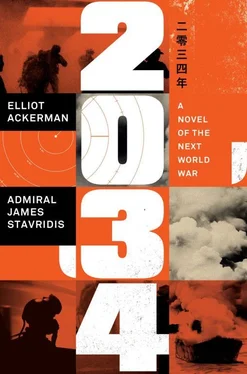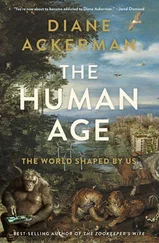
15:32 July 23, 2034 (GMT+8)
South China Sea
It was perhaps the loneliest moment of her life. Hunt stood on the bridge overseeing flight operations, but what she was really there to observe was Hendrickson departing to Yokosuka, then on to Honolulu, and finally back to Washington, where he’d been recalled via an immediate action request, originating from the White House. When Hendrickson received the message, he’d crumpled the sheet of paper, tossed it in a burn bag, and muttered, “Fucking Wisecarver.”
Hendrickson had come to believe that he hadn’t actually been sent to the Enterprise to check up on Hunt; he had been sent to the Enterprise so he would be out of the way when Wisecarver crafted the orders for the nuclear counterstrike. Now that the White House had dispatched those orders, he wanted Hendrickson back in Washington to keep an eye on him. He explained his theory to Hunt.
“But I thought I was the one they didn’t trust?” she asked.
Hendrickson replied, “They don’t trust you. It’s just that they might not trust me either.” In this way, by both being untrustworthy to the same authority, they were once again confederates in the hours that remained before Hendrickson’s departure.
This may have been why, watching his plane dwindle into a speck on the horizon, Hunt felt so spectacularly alone. She returned to her flag cabin. The orders for the counterstrike were locked in her safe, whose combination she struggled with, preoccupied as her mind was. She couldn’t quite bring herself to focus on the detailed planning that would be required of her. Before he’d left, Hendrickson mentioned that he had it “on good authority that the Indians might intervene.”
“Cut the shit. On whose authority?” she’d asked.
Hendrickson would only answer, “A contact of mine from Washington.”
The fantasy of the Indians—or of anyone—intervening proved such an escapist distraction that it took her four attempts to unlock the safe. Then at her desk she unfolded the orders, which totaled three pages, one for each of the targets, coastal cities that read from south to north: Xiamen (population: 7.1 million), Fuzhou (population: 7.8 million), and, lastly, Shanghai (population: 33.24 million).
To both Hunt and Hendrickson, the inclusion of Shanghai seemed chillingly disproportionate. It was China’s most populous city. A strike on Shanghai would assure a counterstrike on New York, Los Angeles, or even Washington. Which wasn’t to say that the staggering number of lives lost in a place like Xiamen or Fuzhou wasn’t grim enough, but it would be difficult to imagine a scenario in which a strike on Shanghai wouldn’t result in an escalation from tactical to strategic nuclear weapons. It was, Hunt thought, a suicide mission. Not that the pilot wouldn’t make it back, though that was unlikely enough. No, it was a suicide mission in the broadest sense. Its accomplishment assured the suicide of much, if not all, of mankind.
As that thought lingered, there was a knock at the door. “Come in,” she said. Wedge stepped across the threshold, wiping some grease from his hands with a filthy rag. He then tucked the rag into the pocket of his flight suit and presented himself to Hunt, snapping to attention. “Christ, at ease,” she said. “I’ve told you that you don’t have to do that.”
Wedge again took the rag from his pocket, working the grease from his palms and beneath his fingernails. “Customs and courtesies, ma’am. A simple sign of respect.”
Hunt held the three pages of the order in front of her. “I appreciate that, but I don’t need the extra deference.”
“It’s not specific to you, ma’am. It’s respect for your rank.” He tucked the rag back into his flight suit. Hunt couldn’t help it; she had come to like Wedge. He was insubordinate. But his insubordination didn’t manifest itself in a refusal to follow orders, or disrespect for his superiors. He was, instead, insubordinate in the broadest sense. He was insubordinate to the time in which he lived. He refused to give up the old ways. Or, put differently, he refused to stop believing in them. Where did Wedge think all this would lead? wondered Hunt. Did he imagine that a bygone order would one day reassert itself? That he could somehow fly through the fabric of time to arrive in a different, better, and older world? Perhaps his insubordination was a form of denial, a rejection not only of the present but of all that was to come.
No matter, she thought cruelly, as she handed him the order for the counterstrike.
“What’s this?” he asked, thumbing through the pages. Hunt didn’t need to tell him; he could read it for himself: Xiamen , Fuzhou ,… Shanghai . His left eyebrow ticked upward when he read the last one. Aside from that he sat across from her stone-faced.
“When can you be ready?” she asked.
“Day after tomorrow,” said Wedge. That would give his pilots a full night’s rest. The Hornets, antiquated as they were, could also benefit from the attention of a twenty-four-hour maintenance stand-down. Each crew chief could then conduct a full inspection of the avionics, airframes, and weapons systems, all of which had proven temperamental during their training runs.
“That’s fine,” said Hunt. “We don’t need to launch any earlier than that.”
“Three flights of three,” answered Wedge. “That sound about right to you?”
Hunt glanced down at her desk and nodded. “Which flight will you take?”
“I figured I’d take Shanghai.”
When he said the name, all Hunt could think was 33.24 million people . The same with the other cities turned targets. Fuzhou wasn’t Fuzhou anymore; it was 7.8 million people . The same for Xiamen: 7.1 million . “Wedge—” she said, his name catching for a moment in her throat. “A lot of folks are calling this a suicide mission.”
Wedge folded up the three sheets of paper Hunt had given him and stuffed them in the same pocket as his dirty rag. “Ma’am, I don’t do suicide missions. We’ll get her done and make it back here.” For a moment, Hunt thought to tell him that wasn’t what she meant by suicide mission. But she thought better of it.
Wedge snapped to attention and was dismissed.

19:25 July 29, 2034 (GMT+8)
Beijing
It took four days before Lin Bao realized that his wife and daughter had fled the city. He’d last seen them when he left for work on a Tuesday. He had stayed that night at the ministry as well as the night that followed. He’d come home the following morning, a Thursday, and had slept from nine o’clock until three o’clock in the afternoon before returning to the ministry. He’d worked all the next day and through that night into Saturday. When he came home around lunch the house was empty. He began to wonder where his family was. When he phoned his wife, she answered on the third try. She and her daughter were staying in her mother’s village in the countryside, hundreds of miles inland—“until this is over,” she had said. Lin Bao asked to speak with his daughter, but she was out taking a walk with her grandmother. “I’ll have her call you back.”
“When?” Lin Bao had asked.
“Soon,” answered his wife.
Lin Bao didn’t protest. What right did he have to? If anything, he was jealous of his wife and daughter. Jealous of the time they had together; jealous of their safety, of their distance from the capital, and of their decision to leave it. He’d been indulging in escapist fantasies of his own, imagining what his life might be like when he left the Navy. He was indulging in one of these fantasies as he settled down in his empty house, rooting around the mostly bare fridge for some dinner. Early the next morning he would need to return to the ministry to monitor the reentrance of the Zheng He into territorial waters. He heated up a microwave meal, a burger and fries, his favorite indulgence, although it never cooked quite right in a microwave. The burger always wound up bland, the fries soggy. Not like it tasted in the States.
Читать дальше













